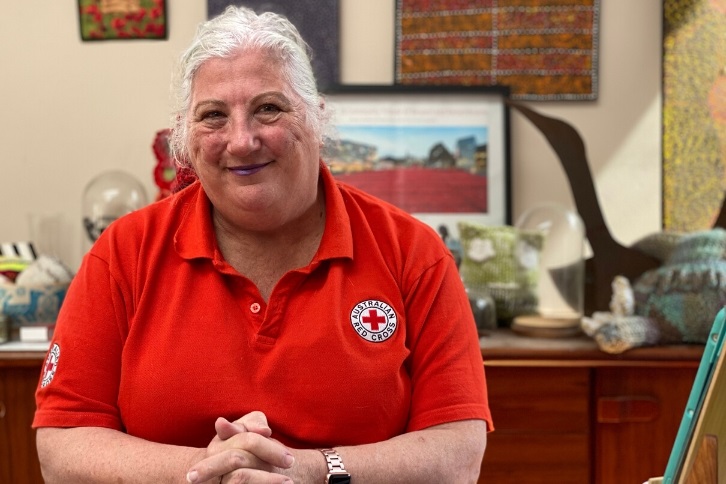A virtual hug and a friendly voice
Susan is an expert in comfort and virtual hugs. She and hundreds of other volunteers phone people who are struggling to let them know there’s a community, right here, they can lean on.

“This is the first time in our lifetime we are not able to connect in the way we are used to, so when you can’t go and talk to people in a coffee shop, a telephone call is the next best thing,” she says. “Connection is a survival tool.”
Susan has helped us during many emergencies. From the 2017 Bourke Street car attack, to the vigil for murdered woman Eurydice Dixon to more recent disasters, including the Black Summer bushfires.
With 10-plus years of experience as a volunteer - and having helped during arguably some of the most traumatic events in Australia’s recent history - Susan understands how important connection is for people experiencing vulnerability or dealing with trauma. It's why, when the call for volunteers went out for our COVID-19 response, she was one of the first to put her hand up.
Susan has helped us during many emergencies. From the 2017 Bourke Street car attack, to the vigil for murdered woman Eurydice Dixon to more recent disasters, including the Black Summer bushfires.
With 10-plus years of experience as a volunteer - and having helped during arguably some of the most traumatic events in Australia’s recent history - Susan understands how important connection is for people experiencing vulnerability or dealing with trauma. It's why, when the call for volunteers went out for our COVID-19 response, she was one of the first to put her hand up.
"To be able to ensure someone who is having probably one of the worst days of their life, is made a little bit better, just through connection and contact … I get the sense of a job well done, being able to help other people."
Susan has been phoning people across Victoria who are socially isolated during this pandemic. She provides a wellbeing check and emotional support.
“Oftentimes they are on disability benefits, or are health-compromised, or have a large family with special needs and can’t go out, life’s been made more difficult by the need to isolate,” she says. “Because this situation exacerbates other (negative) things that are going on, the psychological impacts can make life very difficult.”
“Oftentimes they are on disability benefits, or are health-compromised, or have a large family with special needs and can’t go out, life’s been made more difficult by the need to isolate,” she says. “Because this situation exacerbates other (negative) things that are going on, the psychological impacts can make life very difficult.”

Right now Susan, like many of our team, is volunteering from home. Her day starts in front of her laptop at her dining table, a precious list of names and numbers beside her. She spends the day calling and talking to people – each call can last anywhere from ten minutes up to an hour.
"We are a nice friendly voice coming from a safe place saying, ‘How are you, we care for you, how can we help you?’ It brings a layer of normalcy into their lives - just having a lovely chat and a laugh."
But her calls are more than just a friendly chat. They can be a lifeline – offering support to people who are suffering. Helping them to feel safe, connected, calm and hopeful, as well as ensuring they have access to other support services if needed.
“We look for risks: they might have seven kids in the house but only one box of food, or may need sanitary items, and we escalate. If anyone talks about self-harm they’re immediately escalated up to Lifeline or the police … if they’ve requested a call from us and we’ve rung them a few times and they don’t answer that’s immediately escalated.”
Hundreds of volunteers just like Susan are making thousands of wellbeing calls every day to people in quarantine or self-isolation all over the country. “When you’re forcibly alone it puts a strain on your psychological capacity to get through the day … the people we’re calling are very lonely, so these phone calls show them someone cares.”
Knowing that someone cares is more important now than ever and the phone calls help people to feel better and less isolated, she says. “It’s like a virtual hug. Red Cross is ensuring you are safe and well … it’s about connectedness, being able to be part of a community and knowing you’re not alone.”
Charity donations of $2 or more to Australian Red Cross may be tax deductible in Australia. Site protected by Google Invisible reCAPTCHA. © Australian Red Cross 2024. ABN 50 169 561 394